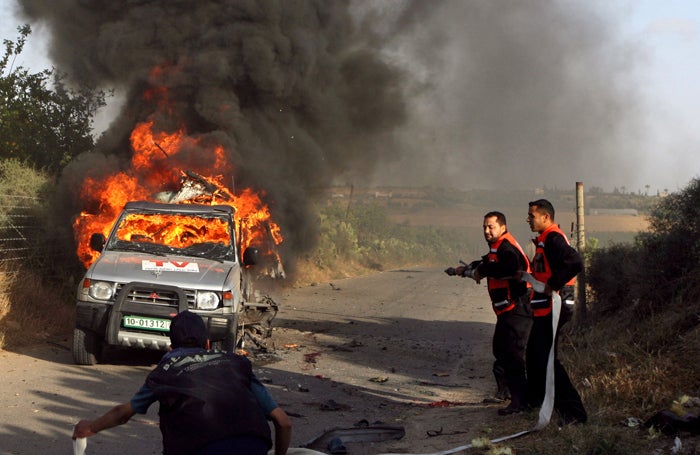Cameraman among 20 dead as violence in Gaza escalates

Your support helps us to tell the story
From reproductive rights to climate change to Big Tech, The Independent is on the ground when the story is developing. Whether it's investigating the financials of Elon Musk's pro-Trump PAC or producing our latest documentary, 'The A Word', which shines a light on the American women fighting for reproductive rights, we know how important it is to parse out the facts from the messaging.
At such a critical moment in US history, we need reporters on the ground. Your donation allows us to keep sending journalists to speak to both sides of the story.
The Independent is trusted by Americans across the entire political spectrum. And unlike many other quality news outlets, we choose not to lock Americans out of our reporting and analysis with paywalls. We believe quality journalism should be available to everyone, paid for by those who can afford it.
Your support makes all the difference.At least 17 Palestinians – including a Reuters cameraman filming tank movements – and three Israeli soldiers were killed yesterday in the heaviest day of Gaza bloodshed since early March.
In the most lethal incident, an Israeli helicopter fired four missiles which landed near the Bureij refugee camp in central Gaza killing nine Palestinians including two youths, according to the Palestinian Health Ministry.
The air strikes came after three Israeli soldiers were killed by Palestinian militants – in an apparent ambush – when they advanced a few hundred metres into central Gaza in what the Army said was an operation against gunmen who had approached the border fence. The casualties, many of them apparently civilians, dimmed still further any hopes of attempts – supported by among others the former US president Jimmy Carter, currently touring the Middle East – to broker a ceasefire aimed at securing an end to rocket attacks from Gaza in return for an end to Israeli military operations in the Strip.
The Reuters cameraman, Fadal Shanaa, 23, was apparently killed in an air strike. Associated Press reported that fellow cameramen who rushed to the scene saw the Reuters Jeep on fire and the dead man lying next to the vehicle alongside other casualties. The witnesses said that Mr Shanaa's vehicle had press markings and that he was also wearing a flak jacket identifying him as a journalist. The Reuters news agency quoted Hamas and medical officials as saying that 11 of the 17 killed by the Israeli military were civilians. The Israeli military said it targeted militant gunmen but was "checking" reports that non-combatants were among the dead.
The original exchanges in which the three Israeli soldiers were killed occurred on the Gaza side of the border across from the vicinity of the Nahal Oz fuel terminal from which supplies were resumed yesterday. They had been shut down in the wake of an attack by militants in Islamic Jihad and two other smaller militant groups that killed two Israeli civilians this week.
The fuel supplies were resumed amid warnings that Gaza's only power station had supplies of industrial fuel to power the turbines only until Saturday. The move will not ease the shortage of diesel and petrol to vehicle users which has brought much of the Strip's motor transport to a halt.
While Israel has cut back diesel and petrol supplies, the problem has also been exacerbated by a strike of Gaza petrol station owners who say they will not distribute the limited supplies made available by Israel. Israeli officials have accused Hamas of preventing fuel distribution in order to create a crisis.
Meanwhile, Hamas said that Jimmy Carter, who was travelling from Jerusalem to Cairo yesterday evening, would meet two Gaza-based Hamas leaders, Mahmoud al-Zahar and Said Siyam, after his arrival in Egypt. While Mr Carter's delegation declined to comment, Hamas official Ayman Taha said: "Mr Carter asked for the meeting. He wanted to hear the Hamas vision regarding the situation, and we are interested in clarifying our position and emphasising the rights of our people."
Mr Carter has largely been shunned by Israel's top leadership partly because he plans to meet Khaled Meshaal, head of Hamas's political bureau in Damascus tomorrow. Mr Carter, a strong advocate of a two-state solution to the conflict, has repeatedly said on his tour that Hamas and Syria should be brought into discussions and urged Israel and the Bush administration in Washington to reverse its policy of isolating Hamas.
Join our commenting forum
Join thought-provoking conversations, follow other Independent readers and see their replies
Comments